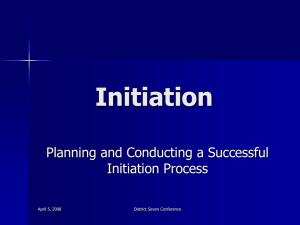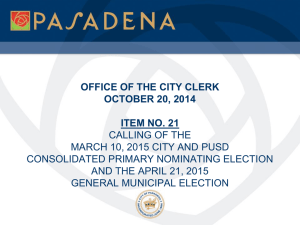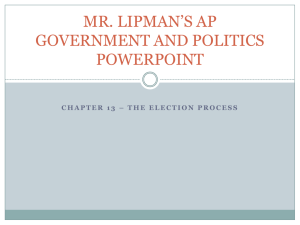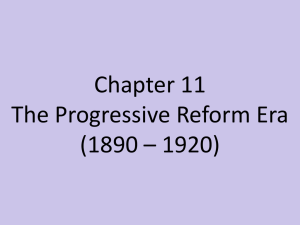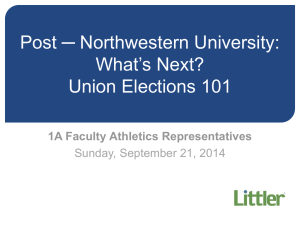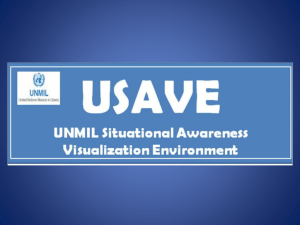The Redistricting Process - Jurupa Unified School District
advertisement
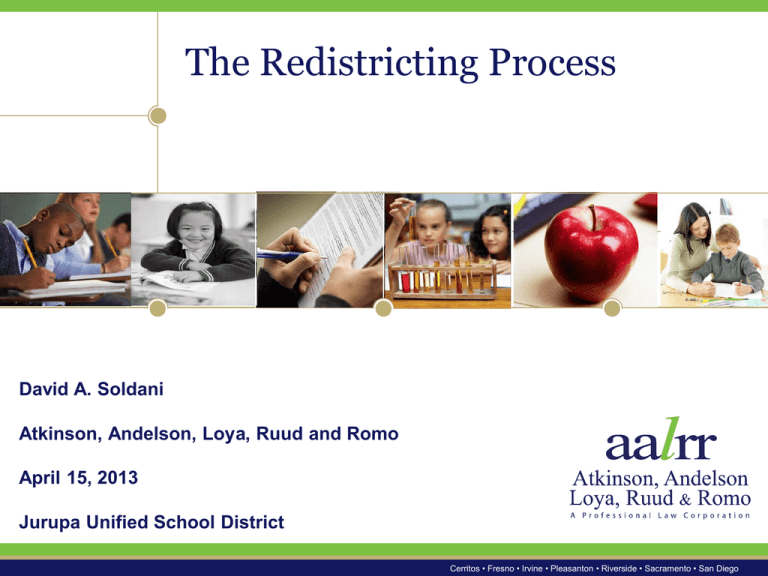
The Redistricting Process David A. Soldani Atkinson, Andelson, Loya, Ruud and Romo April 15, 2013 Jurupa Unified School District Cerritos • Fresno • Irvine • Pleasanton • Riverside • Sacramento • San Diego The California Voting Rights Act of 2001 • Signed into law by Governor Gray Davis on July 9, 2002 • Provides that: An at-large method of election may not be imposed or applied in a manner that impairs the ability of a protected class to elect candidates of its choice or its ability to influence the outcome of an election, as a result of the dilution or the abridgment of the rights of voters who are members of a protected class At-Large Elections Candidates must reside within the District’s boundaries and are elected by all the voters who reside in the District’s boundaries. (Education Code Section 5030(a).) This is the current method used by the District From-Trustee Area Elections Candidates must reside in specific geographic areas within the District’s boundaries called “Trustee Areas”, but are elected by all the voters who reside in the District’s boundaries. (Education Code Section 503(c).) By-Trustee Area Elections* Candidates must reside in specific Trustee Areas within the District’s boundaries and are elected only by the voters who reside in the same Trustee Areas. (Education Code Section 5030(b).) * Only election method immune from liability under the CVRA Changing Election Methods Transitioning From At-Large to ByTrustee Area Election Process The Process • Three different procedures can be utilized to change from an at-large trustee area process to a by-trustee area election process - Initiated by petition of the electorate; - Initiated by the county committee; and - Initiated by resolution of the district (“District-initiated”). (Education Code Section 5019(c)(1).) Transition From At-Large to By-Trustee Area Election Process The Process • District-Initiated Process: - Begins with the District adopting a by-trustee area election map and a resolution requesting that the County Committee on School District Organization approve the transition from an at-large election process to by-trustee area election process. Involving the Public In The Process Transition From At-Large to By-Trustee Area Election Process The Process • The County Committee must hold at least one public hearing within the District’s boundaries. (Education Code Section 5019 (c)(2).) • Following the public hearing, the County Committee must by resolution either approve or reject the proposal and set a date for the election. Transition From At-Large to By-Trustee Area Election Process • If approved, the proposal must be submitted to the District’s voters not later than the next succeeding election for members of the Governing Board. (Education Code Section 5020(a).) The Waiver Process In order to avoid the expense and uncertain outcome of an election on whether to change its election process, the District may file with the State Board of Education (“SBE”) a request to waive the election requirement. • In order to obtain a waiver, a proper application must be completed and submitted to the SBE • The application needs to reflect whether the exclusive representatives of the District’s employees have been involved in the preparation of the waiver request, and their position thereon. The Waiver Process • The Board must hold a public hearing on the waiver request prior to submitting the request to the SBE. (Education Code Section 33050(a),(d)(1) and (2).) • Following the public hearing, the Board may adopt the waiver request. Timeline The timeline for completing the process before the County Committee and the SBE may range from four to six months and involve at a minimum two school board meetings, at least one County Committee meeting, and one State Board of Education meeting. Creation of a By-Trustee Area Plan A demographer and legal counsel can assist the District with dividing the District into Trustee Areas based upon a number of factors: 1. Constitutional “one person, one vote” factor 2. Communities of Interest 3. Natural and man-made boundaries 4. Federal Voting Rights Act Compliance » Citizen Voting Age Population » “Packing” and “Cracking” 5. Respecting Incumbency 6. Other Factors, i.e., following school attendance boundaries or city boundaries, etc. Implementing By-Trustee Area Election Method Regardless of the method utilized to implement the transition, there is no immediate impact on the term of any current member of the District’s Governing Board. (Education Code Section 5021). Instead, all future elections would occur in the trustee areas in which the Board members whose terms are expiring currently reside. Board Vacancies • Should any area be vacated by a sitting board member or should no candidate run in an area, a board member can be appointed to fill the vacant seat, but that board member must reside in the vacant trustee area. Updating Trustee Areas • Districts that already utilize a By Trustee Area Election Method must update their trustee areas every ten (10) years following the decennial census. • Each district is required, by March 1, 2012, to adjust the boundaries of its trustee areas utilizing the census population figures validated by the Population Research Unit of the California Department of Finance. Validated data became available from the Department of Finance on April 1, 2011 • Should any district fail to make such adjustments on or before March 1, 2012, the County Committee on School District Organization is required to make the adjustments for the district by April 30, 2012 and can charge the district for the costs of the adjustments. (Education Code § 5019.5) Question Answer Thank You For questions or comments, please contact: David A. Soldani (559) 225-6700 dsoldani@aalrr.com


